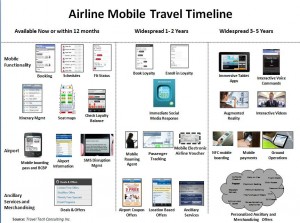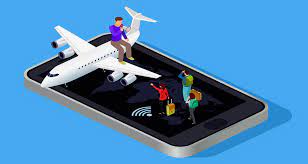- Have any questions?
- Office: +1 (650) 345-8510
- Mobile: +1 (650) 576-6916
- norm@traveltechnology.com
The always-connected traveller: How mobile will transform the future of air travel
Why Amazon’s Entry into the Tablet Market May Be a Game Changer
July 19, 2011Smart Mobs – Now a Reality
August 16, 2011
Earlier this year, Amadeus commissioned Travel Tech Consulting to conduct research on airlines mobile trends. The whitepaper “The Always-Connected Traveller: How Mobile Will Transform the Future of Air Travel” combines research from JD Power with interviews of nine airlines from around the world. Augmented with Travel Tech’s ongoing monitoring of mobile airline trends, the report provides a clear picture of the current state of airline mobile technology and what we can expect in the 1-2 year and 3-5 year time frame.
Most airlines have done the basics which include mobile check-in, 2D bar code boarding passes and itinerary management. Many airlines have mobile booking capability today and most will be adding it over the next 12 months. In developing markets such as Africa and India where the primary connection to the Internet is the mobile device, the entire travel booking process may take place on the mobile phone. Over the next two years airlines will be adding key functionality to their mobile offering to expand merchandising opportunities. Key among these efforts is the ability to book ancillary services on mobile devices. Ancillary services are an important revenue source for airlines, but also provide a way to allow the passenger to customise their travel experience.
Advanced airline mobile innovations we can expect in the 3-5 year time frame fall into two major categories(1) Functions related to the passenger experience and (2) Capabilities that take advantage of advanced mobile device or software features. Passenger experience related functions include:
- Location based services – These are services that provide location sensitive advertisements promoting airport or local merchants as well as local information guides (e.g. airport, gates, baggage carousels, etc…)
- Advanced disruption management – This includes the pushing of alternate flights and the offer of personalised compensation and electronic vouchers for hotels when a flight is cancelled.
- Social media – Monitoring social media comments and targeting the passenger’s physical location to prioritise assistance based on the nature of the issue. Also being considered is the integration of peer reviews during the mobile ticket purchasing process.
- Movement tracking – Depending on local cultural and legal restrictions, automatically identifying a passenger’s location in the airport.
- Advanced push notifications – This has two main purposes, providing the passenger with more information about their flight or baggage and selling ancillary services to monetise the mobile channel
Mobile devices are increasingly becoming electronic wallets and sensors to the world around us. Two important advanced mobile device capabilities that will enable new services for airlines are:
- Mobile payments -The adoption of universal mobile payment systems will allow the passenger to use their phone to pay for goods and services.
- NFC -The integration of near field communication (NFC) technology into the handset. NFC involves two pieces of hardware. One is an NFC chip in a mobile phone and the other is an NFC reader at a merchant or transportation facility. NFC will allow the passenger to speed through the airport check-in and boarding process
Across the globe mobile technology is transforming the future of air travel. Airlines not only need to keep pace with passenger expectations, but also maximise the unique opportunity to use mobile technology for product differentiation, incremental sales and increased brand loyalty. The next 10 years promises to be a wild ride, but for those airlines who seize the opportunity, mobile technology can provide a more efficient, intimate and profitable relationship with passengers.
I will be presenting the results of this whitepaper for an Airline Transport World Webinar sponsored by Amadeus on September 22, 2011.


